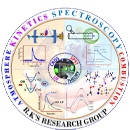Temperature-dependent rate coefficients for the reactions of Cl atoms with trans-2-butene and isobutene were measured over the temperature range of 263–363 K using relative rate technique with reference to 1,3-butadiene, isoprene, and 1-pentene. The measured rate coefficients for the reactions of Cl atoms with isobutene and trans-2-butene are kR1298K= (3.43 ± 0.11) × 10–10 and kR2298K = (3.20 ± 0.04) × 10–10 cm3 molecule–1 s–1, respectively, at 298 K and 760 torr. Measured rate coefficients were used to fit the Arrhenius equations, which are obtained to be kR1–Exp269–363K = (4.99 ± 0.42) × 10–11 exp[(584 ± 26)/T] and kR2–Exp269–363K = (1.11 ± 0.3) × 10–10 exp[(291 ± 88)/T] cm3 molecule–1 s–1 for isobutene and trans-2-butene, respectively. To understand the reaction mechanism, estimate the contribution of each reaction site, and to complement our experimental results, computational studies were also performed. Canonical variational transition state theory with small curvature tunneling in combination with MP2/6-31G(d), MP2/6-31G(d,p), MP2/6-31+G(d,p), CCSD(T)/cc-pvdz, and QCISD(T)/cc-pvdz level of theories were used to calculate the temperature-dependent rate coefficients over the temperature range of 200–400 K. The effective lifetimes, thermodynamic parameters, and atmospheric implications of the test molecules were also estimated.
-
Call
-
E-mail
Journal Details
1. An Experimental and Computational Study on the Cl Atom Initiated Photo-Oxidization Reactions of Butenes in the Gas Phase..
S. Vijayakumar & B. Rajakumar Phys. Chem, , 5487–99., 121
